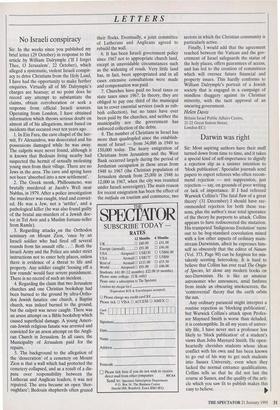LETTERS No Israeli conspiracy
Sir: In the weeks since you published my brief letter (29 October) in response to the article by William Dalrymple (`If I forget Thee, 0 Jerusalem', 22 October), which alleged a systematic, violent Israeli conspir- acy to drive Christians from the Holy Land, I have had the opportunity to make further enquiries. Virtually all of Mr Dalrymple's charges are hearsay; at no point does he record any attempt to substantiate the claims, obtain corroboration or seek a response from official Israeli sources. Operating from London, I have obtained information which throws serious doubt on almost all of his allegations, most based on incidents that occured over ten years ago.
1. In Ein Fara, the cave chapel of the her- mit, Fr Alexandros, was desecrated and his possessions damaged while he was away. The culprits were never found, although it is known that Bedouin living nearby had suspected the hermit of sexually molesting young men from their village. There are no Jews in the area. The cave and spring have not been 'absorbed into a new settlement'.
2. The Greek monk, Philloumeno, was brutally murdered at Jacob's Well near Nablus, in 1979. After a police investigation the murderer was caught, tried and convict- ed. He was a Jew, not a 'settler', and a pathological killer (he was also found guilty of the brutal axe-murders of a Jewish doc- tor in Tel Aviv and a Muslim fortune-teller from Ramle).
3. Regarding attacks on the Orthodox seminary on Mount Zion, 'once by an Israeli soldier who had fired off several rounds from his assault rifle . . .'. Both the Israeli Army and the Police are under strict instructions not to enter holy places, unless there is evidence of a threat to life and property. Any soldier caught 'loosing off a few rounds' would face severe punishment. There is no record of such an incident.
4. Regarding the claim that two Jerusalem churches and one Christian bookshop had been burned to the ground by ultra-Ortho- dox Jewish fanatics: one church, a Baptist church, was indeed burned to the ground, but the culprit was never caught. There was an arson attempt on a Bible bookshop which caused superficial damage. A young Ameri- can-Jewish religious fanatic was arrested and convicted for an arson attempt on the Angli- can Church in Jerusalem. In all cases, the Municipality of Jerusalem paid for the repairs.
5. The background to the allegation of the 'desecration' of a cemetery on Mount Zion is that a wall which had protected the cemetery collapsed, and as a result of a dis- pute over responsibility between the Lutheran and Anglican leaders, it was not repaired. The area became an open 'thor- oughfare'; Bedouin shepherds often grazed their flocks. Eventually, a joint committee of Lutherans and Anglicans agreed to rebuild the wall.
6. It has been Israeli government policy since 1967 not to appropriate church land, except in unavoidable circumstances such as the widening of roads. Very little land has, in fact, been appropriated and in all cases extensive consultations were made and compensation was paid. 7. Churches have paid no local taxes or state taxes since 1967. In theory, they are obliged to pay one third of the municipal tax to cover essential services (such as rub- bish collection), but no taxes have ever been paid by the churches, and neither the municipality nor the government has enforced collection of the debts.
8. The .number of Christians in Israel has more than quadrupled since the establish- ment of Israel — from 34,000 in 1949 to 150,000 today. The heavy emigration of Christians from Jerusalem and the West Bank occurred largely during the period of Jordanian occupation in these areas from 1948 to 1967 (the Christian population of Jerusalem shrunk from 25,000 in 1948 to 12,000 in 1967, when the city was reunited under Israeli sovereignty). The main reason for recent emigration has been the effect of the intifada on tourism and commerce, two sectors in which the Christian community is particularly active.
Finally, I would add that the agreement reached between the Vatican and the gov- ernment of Israel safeguards the status of the holy places, offers guarantees of access, and has led to the creation of committees which will oversee future financial and property issues. This hardly conforms to William Dalrymple's portrait of a Jewish society that is engaged in a campaign of mindless thuggery against its Christian minority, with the tacit approval of an uncaring government.
Helen Davis
Britain Israel Public Affairs Centre, 21-22 Great Sutton Street, London EC1


























































 Previous page
Previous page